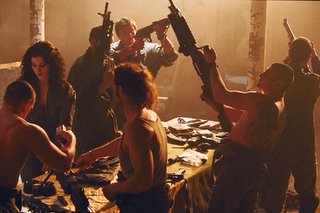36 Quai des Orfèvres
 I found this movie to be a very disturbing one, simply because there was so much violence, which was used simply to gain the ends of the people involved - the picture to the side is of a party like none to which I have ever been inviated (thankfully). Had I known of the level of violence and darkness, I may well not have gone, but a mild mannered colleague of mine had said she was going to see it. I think I am glad I did.
I found this movie to be a very disturbing one, simply because there was so much violence, which was used simply to gain the ends of the people involved - the picture to the side is of a party like none to which I have ever been inviated (thankfully). Had I known of the level of violence and darkness, I may well not have gone, but a mild mannered colleague of mine had said she was going to see it. I think I am glad I did.There are basically two stories going on: a gang has been established to take the contents of security vans carrying cash - we see this happen once: the gang simply drives in front of the cash van and opens fire on them until they stop. So, one story is about the efforts of the Police (based at the address in the film's title) to stop this gang.
The other story is about what the Police are willing to do in order to stop them. To add spice, the boss's job is up for grabs: whichever of Vlink (Auteuil - who I last saw in Closet, where he pretended to be gay in order to be protected from a firing by human rights law) or Klein (Dépardieu) can stop (not bring to justice, just stop) the van gang will be promoted. Neither are exactly squeaky clean: Vlink enters into a Faustian pact with an informer which gets him the identity of the leaders of the gang. Thereafter, he does act as we would expect a good cop to; staking out the gang, setting up a bust and so on. But he has set in train a chain of events which will lead to several fatalities, for which the film builds in enough of a backstory for them to really matter. The main actor in these events is Klein who, it seems, will stop at nothing. His own wife has no faith in his abilities as a cop or a man.
These two are, of course, the senior leading men in French cinema, and they bring a lot to their roles. Added verisimilitude is provided by the fact that there was some basis in reality and that the director is a former policeman. So, plenty of gritty action, good cinematography, very real bullet sounds. About half way through, I had the thought "its not exactly a love story" and yet it turned into one. Vlink is fiercely protective of his relationship with his wife (who may have a history with Klein - I tend to think she did). So keen is he to see her while he is locked up that he procures a couple of guns (I guess he had good contacts) and holds his captors and investigating judge captive so he can see her: once done, he goes back inside quite cheerfully.
The end came in a sort of final showdown between the Vlink and Klein, but resisted the obvious. I think that is what I most liked about this film, they way it developed complexity rather than relying upon a formulaic good v evil: here, everyone is implicated, more or less, in evil. The one possible exception is the rookie cop, Ève Verhagen (Catherine Marchal), who wants to learn from Klein. She ends up so disgusted with his methods that she accepts posting to a complaints desk in the boonies rather than work any longer with him.


0 Comments:
Post a Comment
Subscribe to Post Comments [Atom]
<< Home